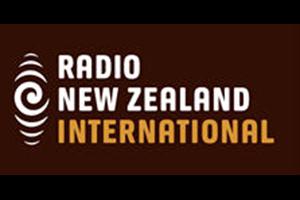
AUCKLAND (Pacific Media Watch / Radio New Zealand International): Radio New Zealand International has interviewed Pacific Media Centre professor David Robie on his new book, Don't Spoil My Beautiful Face: Media, Mayhem and Human Rights in the Pacific.
The book will be launched this evening at the Auckland University of Technology and focusses on the 'secret history' of the Pacific's big contemporary issues.
DAVID ROBIE: The title "Don't Spoil my Beautiful Face" actually comes from a placard which ended up being the photograph actually on the cover and you'll see it's actually at Independence Park in Port Vila, and it was during one of the nuclear free and independent Pacific conferences, and you'll see there's a child there and her mother. The placard that she's got there is "Please Don't Spoil My Beautiful face" and with "no nuc's" on the placard. That just really took my fancy quite a few years ago.
INDIRA MOALA: You have had a long career covering the Pacific and you're calling for a more comprehensive in depth media response to some of the region's challenges.
DR: Yeah it's extremely hard covering the region. Most media, particularly newspapers, just only give a very sparse coverage of the region. And so you get intensive coverage when there are disasters and occasional coups such as in Fiji. But the rest of the time there's virtually very little coverage. So when things do happen in the region, there's very little understanding in New Zealand. And the reaction is "what! Why has this happened?"
IM: I suppose if you are part of the media inside the Pacific region as well, it's quite hard to cover because - respect for cultural protocol and politics can often restrict the way you cover content.
DR: Well that's always a problem too and then of course there's the default line that politicians have right across just about every Pacific country. They regard the media as an absolute nuisance and if they have any chance whatsoever, they put a clamp on what the media can do and can't do. So if there isn't outright censorship as there was for awhile in Fiji after the 2006 coup, there's always a climate of self censorship imposed by politicians in the region.
IM: Some of the titles of your chapters include: 'Rise of the Flosse Dynasty in Tahiti', there's 'Fiji's countdown to a coup', 'the Chinese connection in Tonga' and 'human rights abuses in the Pacific' - and those are only some of the events and/or issues you covered on colonial conflicts. From your research and long career of reporting in the Pacific, obviously adapting to colonisation and perhaps the politics that come with it, is it still a struggle in many parts of the Pacific?
DR: Yes, well there are the forgotten areas. Timor Leste was forgotten for a quarter of a century and from Australia and New Zealand's perspective they weren't interested and they thought: 'Well, it's a done deal,' Indonesia controlled East Timor and then of course what happened? Independence came, and now West Papua's in the same situation. So colonialism still has a legacy that hasn't actually been completely swept away yet. But of course there are other issues now in the region; which is climate change, the asylum seekers issue, the way Australian policy is pushing the problem on to the Pacific rather than dealing with it itself.
IM: Yes, you've got a chapter on human rights abuses in the Pacific, I was going to ask, do you touch on asylum seeker issues at all?
DR: Yes, yes there are sections on that, but of course bear in mind that the book was largely completed more or less by the end of last year apart from a few updates that I managed to get in before it was printed.
IM: You're a European. What drove you to a career reporting on the Pacific region?
DR: Um, a good question. Back door way should I say because I worked for the French news agency in Paris for a few years and then I became intensely interested in French colonial policy in the region and when I came back to New Zealand my interest in the Pacific grew and grew.
This work is licensed under a Creative Commons Attribution-NonCommercial 3.0 New Zealand Licence.




